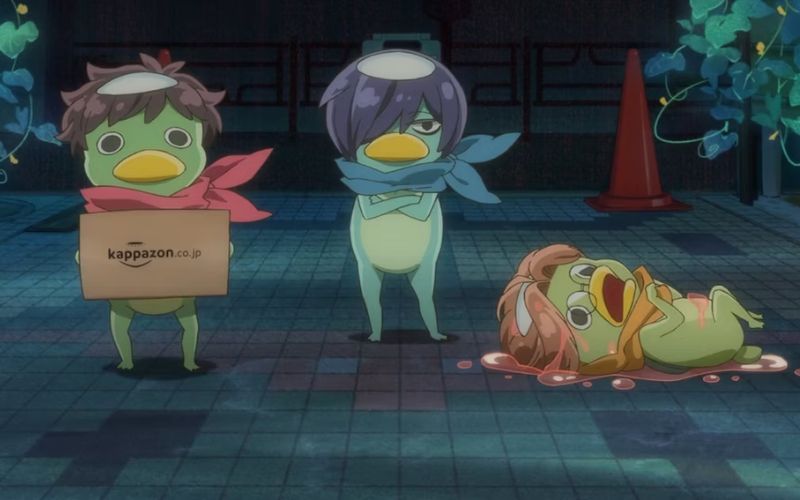The world of anime is vast and diverse, drawing on a multitude of sources for inspiration, from historical events to folklore and mythology. Among the many creatures that have made their way into anime from Japanese mythology, the Kappa stands out as one of the most intriguing. The Kappa, often depicted as a water-dwelling creature, has been a staple of Japanese culture for centuries and has found its way into various anime series and films, each with its unique interpretation. This article will explore the origins of the Kappa, its portrayal in anime, and its cultural significance.
Origins of the Kappa
The Kappa is a mythical creature from Japanese folklore, often depicted as a small, humanoid figure with a dish-like depression on its head that holds water. This water is said to be the source of the Kappa’s power, and if the water spills out, the creature is rendered powerless. Kappa are typically associated with water bodies like rivers and ponds and are often portrayed as mischievous, sometimes even malevolent beings.
In traditional stories, Kappa are known for their trickster nature, playing pranks on humans, but they are also said to have a darker side, luring people, particularly children, into the water to drown them. Despite their potentially dangerous nature, Kappa are also depicted as beings of honor. They are bound by a strong sense of etiquette, and if a person bows to a Kappa, it will feel compelled to bow back, causing the water in its head to spill and thus render it powerless.
The Kappa in Japanese Culture
Kappa are deeply ingrained in Japanese culture, with their presence felt in various aspects of daily life. There are numerous shrines dedicated to Kappa across Japan, and they are often depicted in art, literature, and even in modern-day mascots for cities and towns. The Kappa’s dual nature, being both a figure of fear and respect, reflects the complex relationship the Japanese have with nature, particularly water, which is both life-giving and potentially dangerous.
Kappa in Anime: A Symbol of Tradition and Modernity
Anime has always been a medium that draws heavily on Japanese culture, and the Kappa is no exception. Over the years, the Kappa has appeared in numerous anime series and films, each time with a unique twist that reflects the show’s themes and the creators’ vision.
1. Traditional Portrayals: The Kappa as a Mythical Creature
In many anime, the Kappa is portrayed in a manner that closely aligns with its traditional depiction in folklore. These portrayals often emphasize the Kappa’s mischievous nature and its association with water. For example, in the anime GeGeGe no Kitaro, a series that features various yokai (Japanese spirits), the Kappa is depicted as a somewhat silly but ultimately harmless creature. The show uses the Kappa to introduce younger audiences to traditional Japanese folklore, making it accessible and entertaining.
Similarly, in Nura: Rise of the Yokai Clan, the Kappa is depicted as a loyal follower of the protagonist, Rikuo Nura, who is the heir to a powerful yokai clan. The Kappa in this series retains its traditional characteristics, such as its dependence on water, but is also given a more humanized and sympathetic portrayal, highlighting the themes of loyalty and honor.
2. Modern Interpretations: The Kappa as a Metaphor
In more modern interpretations, the Kappa is often used as a metaphor for various themes, ranging from environmentalism to the complexities of human nature. One notable example is the anime Sarazanmai, a surreal and highly stylized series that reimagines the Kappa in a contemporary setting.
In Sarazanmai, the Kappa are central to the plot, with the three main characters being transformed into Kappa by a Kappa prince named Keppi. The series uses the Kappa as a vehicle to explore deep and often dark themes, such as desire, connection, and the consequences of actions. The traditional elements of Kappa folklore are present, but they are reinterpreted in a way that resonates with modern audiences, reflecting contemporary issues and anxieties.
The Kappa in Sarazanmai are also depicted as beings that can bridge the gap between the human and spiritual worlds, highlighting the ongoing relevance of traditional mythology in understanding modern life. The show’s use of the Kappa as a metaphor for connection and communication speaks to the timeless nature of these mythical creatures, showing how they can be adapted to explore new ideas while still maintaining their roots in folklore.
Cultural Significance of Kappa in Anime
The recurring appearance of Kappa in anime speaks to their enduring significance in Japanese culture. As a symbol, the Kappa represents a connection to the past, reminding viewers of the rich tapestry of myths and legends that have shaped Japanese identity. At the same time, the Kappa’s ability to be reinterpreted and reimagined in various contexts highlights the adaptability of these myths and their relevance in contemporary society.
The Kappa also serves as a reminder of the duality present in many aspects of life. Just as the Kappa is both a trickster and an honorable being, it represents the balance between nature’s benevolent and malevolent forces. This duality is a common theme in Japanese culture and is often reflected in anime, where characters and stories explore the gray areas between good and evil, tradition, and modernity.
Moreover, the Kappa’s role in anime often serves as a reflection of the medium’s broader role in preserving and transmitting cultural heritage. By incorporating traditional elements like the Kappa into modern narratives, anime helps keep these myths alive, ensuring that they continue to resonate with new generations of viewers. This preservation of cultural heritage through anime is particularly important in a rapidly globalizing world, where traditional practices and beliefs are at risk of being overshadowed by modern influences.
The Future of Kappa in Anime
As anime continues to evolve and explore new themes and ideas, the Kappa will likely continue to be a popular figure in the medium. The creature’s rich history and cultural significance provide a wealth of material for creators to draw upon, allowing for endless reinterpretations and adaptations.
Future portrayals of Kappa in anime may delve even deeper into the creature’s symbolic potential, using it to explore complex social and environmental issues. For example, as concerns about climate change and environmental degradation grow, the Kappa’s association with water and nature could make it an ideal symbol for stories that address these themes.
Additionally, as anime becomes increasingly popular on a global scale, the Kappa could serve as a bridge between cultures, introducing international audiences to the richness of Japanese mythology. By highlighting the Kappa’s unique characteristics and its place in Japanese culture, anime can foster a greater appreciation for the diversity of global folklore and how these stories can inform our understanding of the world.
Conclusion
The Kappa is more than just a mythical creature from Japanese folklore; it is a symbol of the complex relationship between humans and nature, tradition and modernity. Through its various portrayals in anime, the Kappa has evolved from a figure of fear and reverence into a versatile character that can be used to explore a wide range of themes and ideas.
Whether depicted as a mischievous trickster, a loyal companion, or a metaphor for deeper societal issues, the Kappa remains an enduring figure in anime, reflecting the ongoing relevance of traditional mythology in contemporary culture. As anime continues to push boundaries and explore new territories, the Kappa’s role in the medium is likely to grow, offering endless possibilities for creators and audiences alike.
In a world where the past and the present are constantly intersecting, the Kappa stands as a reminder of the power of stories and how they can transcend time, bridging the gap between generations and cultures. As long as anime continues to draw on the rich tapestry of Japanese mythology, the Kappa will remain a beloved and enduring presence in the medium, captivating audiences with its unique blend of tradition and innovation.



